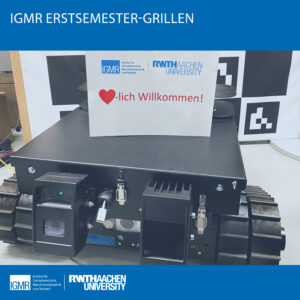IFToMM D-A-CH in Rostock
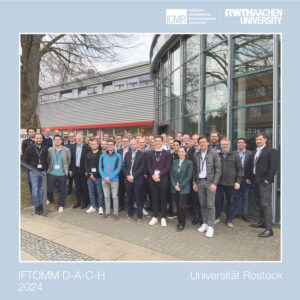
The IGMR was represented at this year’s IFToMM DACH in Rostock with a wide range of topics!
We presented exciting insights into the following topics:
– Extension of the PlanSys2 framework
– Digital twins in intelligent manufacturing
– Function-driven multidirectional additive manufacturing
– Energy-efficient non-uniformly translating gerars
– Digital teaching offerings in machine dynamics
Curious? The conference proceedings including our contributions are available here!
Contact person:
Simon Schläger
Sophie Charlotte Keunecke
Mark Witte
Thomas Knobloch
Nils Brückmann
A big thank you to the organizers and all participants for a great conference with inspiring exchange!
The Service Center for Advanced Robotics at IGMR is your pioneer for innovative automation projects
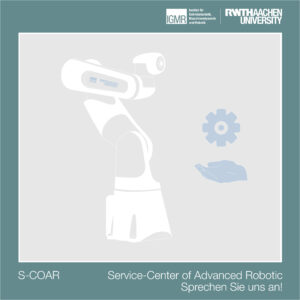
Ideas and support for automation in various specialist areas
Dr. Markus Schmitz is your contact for the implementation and planning of automation projects and for technical advice. Please send requests for quotations to scoar@igmr.rwth-aachen.de.
Exploration of Automated Capability Estimation for Human-Robot Teaming
Der an dieser Stelle eingebundene Inhalt führt Sie auf Seiten, die von der von Google betriebenen Seite YouTube - YouTube, LLC, 901 Cherry Ave., San Bruno, CA 94066, USA - zur Verfügung gestellt werden. Mit dem Aufruf des Inhalts kann YouTube Ihre IP-Adresse und die Sprache des Systems, sowie verschiedene browserspezifische Angaben ermitteln. Wenn Sie in Ihrem YouTube-Account eingeloggt sind, ermöglichen Sie YouTube, Ihr Surfverhalten direkt Ihrem persönlichen Profil zuzuordnen. Dies können Sie verhindern, indem Sie sich aus Ihrem YouTube-Account ausloggen. YouTube verwendet Cookies und Tracking-Tools. Die Datenverarbeitungsvorgänge sowie die Zwecke der Verarbeitung können direkt bei YouTube erfragt und eingesehen werden.
In our Human-Robot Teaming group, we have a vision that humans and robots will one day be able to work together seamlessly and intuitively in a kind of human-machine symbiosis. Recently, we implemented an exploration application to demonstrate the potential of human-robot teams. The exploration includes a human capability assessment system to evaluate human potential and derive appropriate robot actions.
In the future, robots will be able to use the identified capability deltas to find gaps between human performance and the requirements of the work process. Based on these deltas, actions will be derived that do not take work away from humans, but instead increase human capabilities until the requirements are met. Such systems will enable the human-robot team to reach a state that is similar to what is called “flow”.
contact:
Carlo Weidemann
Robot Cooking – Transferring observations into a planning language
Transferring observations into a planning language: An automated approach in the field of cooking
In the Robot Cooking project, an automated method is developed to analyze and identify motion data and convert it into a machine-readable planning language. This is done using a cooking scenario as an example in which the motion data is captured by recording the hand pose of the cook.
The recording is done using a motion capture system consisting of seven cameras and a glove with three markers on the back of the chef’s hand. The position of the markers is determined by triangulation. This provides enough information to derive the hand pose. The recording is done at 120 frames per second. Before the cooking process, all objects in the workspace are identified and their initial positions determined. Motion data is continuously recorded and converted into poses with time stamps. Additional information such as velocity, acceleration and angle in relation to the tabletop are derived from the raw data.
A initial structure of the dataset is created by finding the side actions using classification. Here, pick, move and place are identified as recurrent side actions. A separate training dataset is used to train a classifier that recognizes these actions. This enables an easier analysis of the remaining actions.
Clustering is applied to identify unknown actions. A dynamic approach allows analysis despite high variability in execution. A unique fingerprint for each action is found, based on the orientation of the back of the hand and its speed on the table plane, to assign each frame to a cluster and finally to an action.
The knowledge gained from classification and clustering is translated into a machine-readable Planning Domain Definition Language (PDDL). A schedule is created, with known actions directly assigned. Start and end positions are specified, and virtual object tracking is used to represent the progression of objects during cooking. For unknown actions, preconditions and effects are handled dynamically. The results are translated into a machine-readable PDDL. This formal representation enables efficient automatic scheduling and execution of the previously demonstrated cooking task.
Additional information is available in the video linked above, the poster and the paper.
Contact:
Markus Schmitz
Situational adaptive movement prediction for firefighting squads in indoor attack
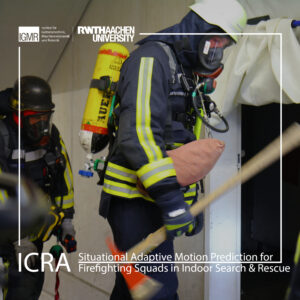
We presented our paper “Situational Adaptive Motion Prediction for Firefighting Squads in Indoor Search and Rescue” at ICRA in the Long-Term Human Motion Prediction workshop.
Firefighting is a complex but poorly automated task. To minimize ergonomic and safety risks for firefighters, robots could be used in a collaborative approach. To enable human-robot teams in firefighting, important fundamentals are still missing. Among other things, the robot must predict human movement because occlusions are ubiquitous. In this work, we propose a novel motion prediction method for firefighting squads in indoor attack. Squad paths are generated using an optimal graph-based planning approach that represents firefighter tactics. Paths are generated on a per-room basis, allowing dynamic local adaptation of paths without global replanning. The movement of individual agents is simulated using a modification of the Headed Social Force Model. We evaluate the feasibility of the pipeline using a novel dataset generated from real footage and show its computational efficiency.
Contact: Elodie Hüsing
New research topic at IGMR: Pick & Toss
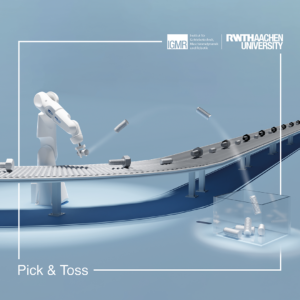
Today’s production plants would be unthinkable without robotic pick & place processes. Handling objects are picked by the robot and placed at the target position with the desired target orientation. An innovative possibility to significantly increase the workspace of a robot and to reduce process times is the extension of this process by the targeted throwing of handling objects. Possible areas of application are the sorting of products that are not damaged during the throwing process (e.g. screws or nuts) or whose damage is of secondary relevance (e.g. sorting out defective products, separating materials in recycling plants).
Our goal is to describe the robotic pick & toss process using a combination of classical analytical and machine learning models to make the innovative process industrially viable.
Contacts:
Nils Brückmann
Johannes Bolk
Developments with Trapo GmbH
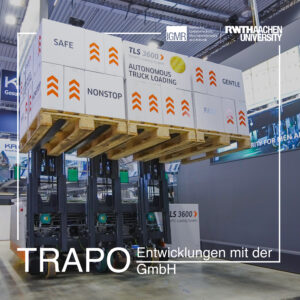
The IGMR – RWTH Aachen supports Trapo GmbH in the further development and integration of trajectory planning and trajectory execution algorithms for the new Trapo Loading System robot. Compared to the old TLS, the navigation of the new TLS is realized with the MoveBase Framework of the Robot Operating System (ROS). For this purpose, together with Trapo GmbH, we have created a special configuration for car-like structure for the local MoveBase Planner. The new TLS was last presented at the LogiMat trade fair.
Contact:
Daniel Gossen
Project launch IIDEA – Inclusion and integration through cobots on the labor market
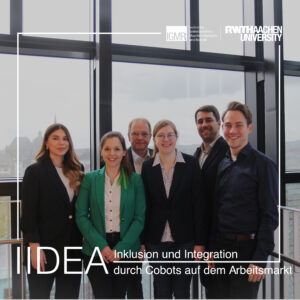
In April, the innovative project “IIDEA – Inclusion and integration through cobots in the first labor market” was launched, which aims to empower the inclusion and integration of severely disabled people in the first labor market through collaborative robotics.
The deployment of cobots makes it possible to create new jobs and forms of work that satisfy the individual needs of severely disabled people. These new forms of work are not being established on the margins but at the heart of digitization and Industry 4.0.
In a rapidly changing world, we must focus on the needs of all people and ensure that everyone can reach their full potential. The IIDEA project is an important step towards an inclusive and inclusive society and economy.
For more information about the project, please visit the project profile. If you have any further questions, please feel free to contact our staff: iidea@igmr.rwth-aachen.de.
Contacts:
Prof. Mathias Hüsing
Carlo Weidemann
Sophie-Charlotte Keunecke
Elodie Hüsing
Christina Jansen
Welcoming the new Master’s first semester students
The Institute of Transmission Technology, Machine Dynamics and Robotics welcomes all new first-semester Master’s students!
The summer semester started on 03.04.2023 and with it the Master’s program for many first-semester students. At a welcome barbecue organized by the Mechanical Engineering student council, we were able to introduce our institute and talk to students.
Sophie Charlotte Keunecke, Nils Brückmann, Vincent Brünjes and Thomas Knobloch welcomed the new Master’s students from the Faculty of Mechanical Engineering at the IGMR. This allowed the students to make their first contacts with the institutes and also get to know various projects. A special highlight was the presentation of the Robot Companion by Maximilian Hilger!
We would like to thank the Mechanical Engineering student council for this great offer and your immense commitment.
We wish all new first-year students all the best for their studies and an unforgettable time at RWTH and the Faculty of Mechanical Engineering.
Contacts:
Sophie-Charlotte Keunecke
Nils Brückmann
Vincent Brünjes
Thomas Knobloch


